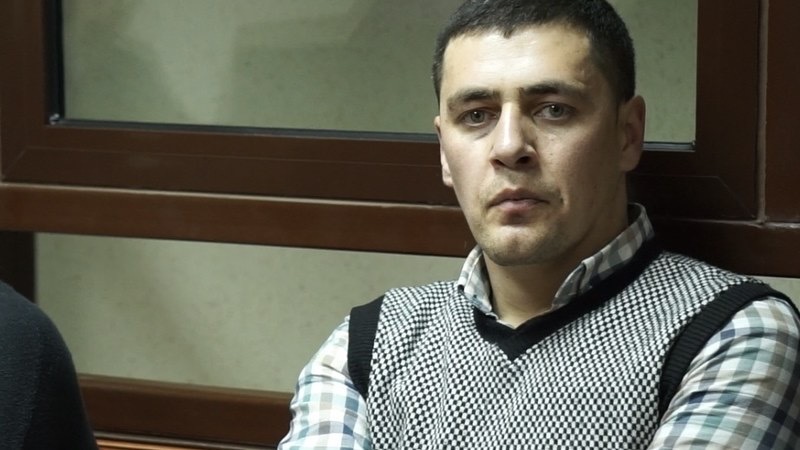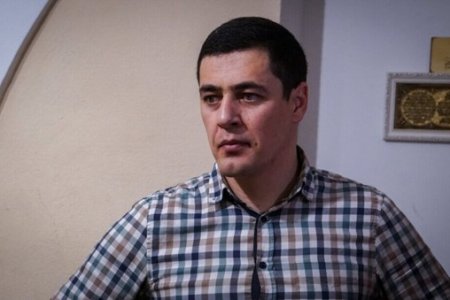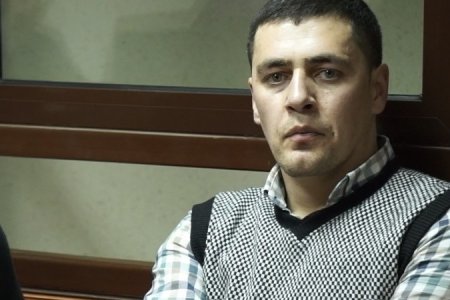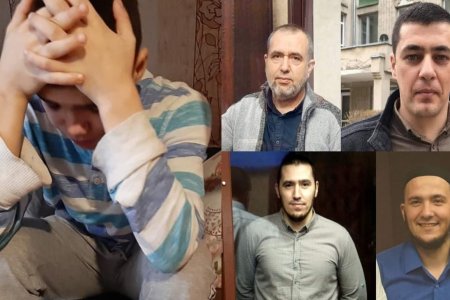
Russia’s treatment of civic journalist Amet Suleimanov is placing the Crimean Solidarity civic journalist’s life in immediate danger, yet a hearing on his release due to medical reasons has been delayed for two months, until 27 September. It is possible that the doctors who failed to appear at the hearing on 27 July were fully aware of Suleimanov’s heart condition, but lacked the courage to speak out over a political prisoner who should never have been placed in detention. This would not have been a matter of their medical opinion, since Suleimanov has conditions that even Russia admits should preclude detention, but the doctors presumably feared being the harbinger of politically inconvenient news.
Suleimanov has been held at SIZO [remand prison] No. 2 in occupied Simferopol since he was taken into custody on 5 April 2023. The Russian penal administration clearly understand that he would not survive the gruelling journey to a Russian prison colony but have no problem with holding him in a SIZO, in conditions that certainly amount to torture. He is held in a cell where, from 6 a.m. to 22.00 he is not allowed to lie down and can only stand or sit on a narrow bench. His condition has, as a result, worsened significantly, and he is suffering from severe breathlessness and pain in the joints, and has worryingly swollen legs. Since his imprisonment, he has also been diagnosed as suffering from grade 2 knee osteoarthritis, or irreversible damage to the cartilage inside the knee joint. This seriously compromises mobility and almost certainly exacerbates the pain and discomfort he is enduring.
Amet’s wife, Lilia Lyumanova reports that he is not allowed to keep any kettle or water-heating device and can therefore not even drink tea, let alone cook anything nourishing. She was told by the head of the SIZO that prisoners are allowed to ask for hot water from the guards. Perhaps they are, but her husband is not given any. Suleimanov’s family can only pass him 20 kilograms of food products or other needed items once every three months.
Even the possibility of using the SIZO library is gravely limited. Prisoners are supposed to be able to choose books, however the prison staff are depriving him even of any choice. They have also taken his Quran away and prevent him from carrying out his morning and evening prayers, threatening to throw him in a punishment cell for what they claim is ‘violation of prison rules’. Lilia was also appalled to learn that they force her husband to learn and repeat the Russian anthem. He is also not passed letters, and they do not take his letters and send them on to his family.
In addition, Suleimanov is receiving worse treatment with respect to ‘walks’. Instead of the requisite hour each day in a courtyard where there is at least fresh air, Suleimanov is taken out for a mere 10-20 minutes.
All of this is particularly criminal given that Amet Suleimanov was so evidently weak during the armed FSB raid back in March 2020 that the FSB, for the first time ever in such cases, only asked for him to be placed under house arrest, not in SIZO. Suleimanov suffers from chronic rheumatic heart disease, aortic insufficiency, coronary artery disease and third level mitral valve prolapse, and urgently needs a heart valve transplant. His worsening health condition had recently forced him to give up his civic journalist work for the important Crimean Solidarity human rights initiative, with that activity almost certainly what prompted the Russian FSB to make him one of the targets for their worst conveyor belt of repression in occupied Crimea.
Amet Suleimanov (b. 1984) was arrested on 11 March 2020, together with the two sons of a renowned Crimean Tatar historian – Seitumer Seitumerov (1988) and Osman Seitumerov (b. 1992) and their maternal uncle Rustem Seitmemetov (b. 1973). The FSB, seemingly, planned five arrests that day, however the fifth man, a journalist (also called Seitumer Seitumerov) was already in mainland Ukraine, so they confined themselves to terrorizing his parents.
The men were charged with a modern Russian version of the accusation during Stalin’s Terror used as an excuse for executing the two Seitumerov brothers’ great-grandfather. Instead of executing for so-called ‘counter-revolutionary terrorist propaganda’, the Russian occupation regime use a dodgy and secretive 2003 Supreme Court ruling which declared the peaceful transnational Muslim Hizb ut-Tahrir organization to be ‘terrorist’ as excuse for imprisoning Crimean Muslims for up to 20 years. Hizb ut-Tahrir is legal in Ukraine, and is not known to have committed acts of terror anywhere in the world, but Russia has been using the 2003 ruling since 2016 as a weapon of repression, especially against Crimean Tatar civic journalists and activists. No proof of actual membership of Hizb ut-Tahrir is even required since the FSB often plant ‘prohibited religious literature’ during their armed ‘searches’ carried out without lawyers present, as well as FSB-loyal ‘experts’ and thoroughly suspicious ‘secret witnesses. In this case, the identity of these supposed witnesses was, in fact known. Both Konstantin Tumarevich, a fugitive from justice in his native Latvia and Nazrulayev Salakhutdin, an Uzbek national, had every reason to collaborate with the FSB. They are known to have taken part, as purportedly anonymous witnesses in securing Russia’s horrific sentences against at least 14 Crimean Tatar political prisoners.
Seitumer Seitumerov was charged under the more serious Article 205.5 § 1 of Russia’s criminal code with ‘organizing a Hizb ut-Tahrir group’, while Osman Seitumerov, their uncle Rustem Seitmemetov and Amet Suleimanov were charged with ‘involvement’ in this entirely unproven ‘group’, under Article 205.5 § 2. All of the men were also accused of ‘planning a violent uprising’ (Article 278) although even the FSB admitted that not one of them was suspected of actions or direct plans to commit any action aimed at ‘overthrowing the Russian constitutional order’
Despite flawed charges and non-existent evidence, Russian prosecutor Yevgeny Nadolinsky demanded horrific sentences against all four men, including 13 years in the case of Suleimanov (whom he had previously tried to get remanded in custody). On 29 October 2021, three ‘judges’ from the Southern District Military Court in Rostov (Russia) - Igor Kostin (presiding judge); Roman Plisko and Yevgeny Zviagin – sentenced Seitumer Seitumerov to 17 years; Osman Seitumerov to 14 years; Rustem Seitmemetov to 13 years and Amet Suleimanov to 12 years. All sentences were for harsh-regime prison colonies, with the first 3.5 years to be in a prison, the very worst of Russian penal institutions.
Despite the profoundly flawed charges, the lack of any evidence and the fact that Suleimanov was unlikely to survive even the journey to prison, these sentences were upheld by ‘judge’ Aleksandr Aleksandrovich Mordovin and two colleagues from the Military Court of Appeal in Vlasikha (Moscow region) on 9 February 2023.
It is clear that every individual involved in this shameful prosecution understood that Suleimanov’s life was on the line. The penal service would normally take a person into custody in the courtroom, but here chose to await the ruling coming out in print.
By 22 February 2023, in response to an urgent application by Ukrainian lawyer Serhiy Zayets, the United Nations Committee against Torture [CAT] issued an interim decision, calling upon Russia to abstain from implementing this effective death sentence against Suleimanov. It also asked Russia to ensure that Suleimanov receive a comprehensive medical examination in a specialized medical facility and that he undergo heart surgery and/or treatment in accordance with the results of the examination.
This ruling was brazenly flouted with Amet Suleimanov taken into custody on 5 April.
Russia has already killed 60-year-old Crimean Tatar civic activist Dzhemil Gafarov who should also never have been in detention, and caused the death of another political prisoner Kostiantyn Shyrinh (63).
Please help to save Amet Suleimanov’s life by ensuring publicity, perhaps by contacting journalist organizations and / or your government representatives. Like other Crimean Solidarity journalists and activists, Suleimanov has been arrested for reporting on Russian repression in occupied Crimea. In his case this is undoubtedly a death sentence.


